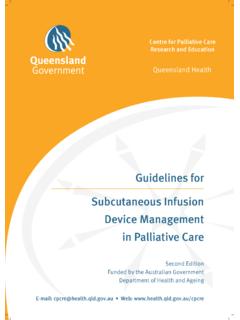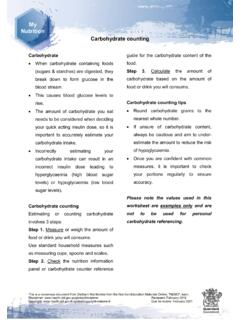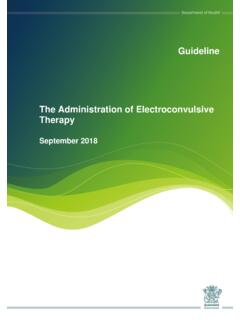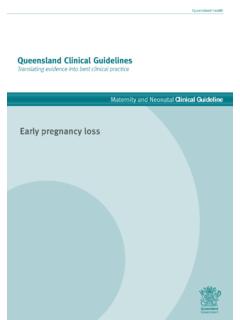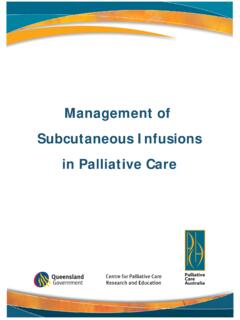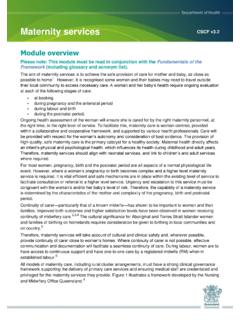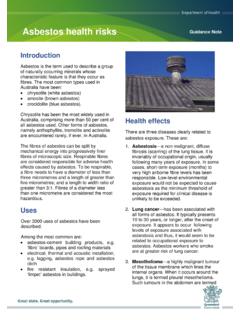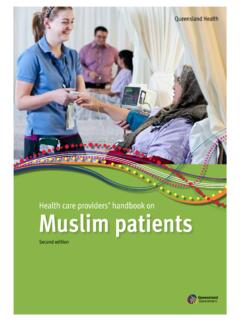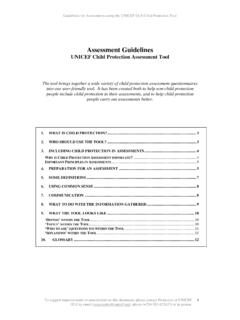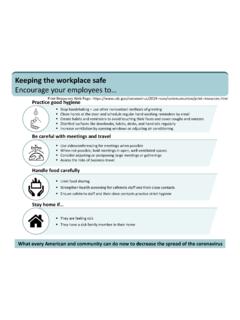Transcription of Working with Interpreters Guidelines - Queensland Health
1 Workingwith InterpretersGuidelinesQueensland Health Interpreter Ser viceThe contact details for theQueensland Health External Interpreter Ser vice Provider are detailed on the Queensland Health Electronic Publishing Ser vice (QHEPS) multicultural HealthAcknowledgement These Guidelines were based on a review of existing Guidelines used by government and non-government agenciesin Queensland and Australia. These Guidelines were developed by the Interpreter Services Working Partywhich comprised representations of National Accreditation Authority for Translators and Interpreters (NAATI),Australian Institute of Interpreters and Translators Incorporated (AUSIT), Multicultural Affairs Queensland , Queensland Deaf Society, Multicultural Development Association (Brisbane), Spiritus,Local Government Association Queensland , Policy and Legislation Branch, Southside Health Service District,Mater Hospitals, Princess Alexandra Hospital, Queensland Transcultural Mental Health Centre,Royal Brisbane and Womens Hospital and West Moreton Health Service District.
2 Queensland Health 20071 Working with Interpreters GuidelinesTable of contentsPurpose .. 2 When Interpreters should be engaged .. 2 How to identify if an interpreter is needed .. 4 Why you need to work with accredited Interpreters .. 6 How to ensure the most skilled and appropriate Interpreters are engaged .. 6 Limited circumstances where unaccredited bilingual speakers,including family and friends, can be used .. 9 Risks of communicating through unaccredited Interpreters .. 10 Procedure to follow when people refuse the offer of an accredited interpreter .. 11 The Queensland Health Interpreter Service how it works .. 13 How to work with an interpreter on site.
3 14 How to work with an interpreter telephone .. 22 How to work with an interpreter videoconference .. 27 Assessing the quality of a professional interpreting session .. 31 Support .. 33 Feedback .. 33 Attachment 1: The Triangle of Communication .. 342 Queensland HealthPurposeThe purpose of these Guidelines is to give effect to the Queensland Government and Queensland Health Language Services policies. The aim is to facilitate effective interpreting services for people accessing or receiving Queensland Health services and who require an interpreter. An interpreter is someone who conveys an oral message or statement from one language to translator is someone who conveys written messagesor statements from one language to Interpreters should be engagedAn accredited interpreter should be engaged when the information to be communicated is significant for Health and/or Health outcomes, the personhas a Queensland interpreter card, the person requests an interpreter or the person s English skills are assessed to be inadequate for the specific Health care events where Interpreters should be engaged include.
4 Key phases of care admission/intake inter views to establish clinical histories assessments, diagnosis and development of treatment plans discussions seeking consent for surgery, invasive procedures,investigation, treatment and research pre-operative and post operative instructions informing people of results of investigations and procedures providing information about medications discharge procedures and Queensland Health Language Services Policy with Interpreters GuidelinesAnd the following special circumstances mental Health assessment, diagnosis and treatment counselling psychological assessment speech pathology death of a person and bereavement counselling seeking consent for autopsy following the birth of a child with disability seeking consent for organ donation situations involving any suspected abuse, violence or assault2 Patient Review and Mental Health Review Tribunals complaint procedures discussions concerning patient status, Health insurance and accountsfor example of a situation where an accredited interpreter is not requiredis during routine and ongoing renal dialysis.
5 Interpreters may be requested by reception and administration staff andstaff providing direct Health service delivery. Interpreters may also be requested by management or staff undertaking community engagement or Health promotion/community This is an update of the Queensland Health Language Ser vices Policy as some mandator y repor ting has been introducedsince HealthHow to identify if an interpreter is neededSome people may be unable to communicate in English at all or will have such minimal English proficiency that the decision to request an interpreter will be obvious. A person s proficiency in English may indicate they may not understand medical terms such as informed consent or medication compliance.
6 Some will bring a Queensland Government I need an Interpreter card . However, if thereis any doubt, here are some simple tests to help you make your decision: ask a question that requires the person to answer in a sentence. Avoid questions that can be answered with a yes or a no or a familiar question such as Where do you live? ask the person to repeat a message that you have just given in his/her own the interpreter is there to enable you to do your job competently,not only for the you decide that an interpreter is required, you will need to discuss this with the person prior to arranging the interpreter. Consider engaging a telephone interpreter for this.
7 The Queensland Health Language Identification Card has been developed asa tool to help you identify a person s language. The Language IdentificationCard contains the following statement in 66 community languages: Please point to your language. We will arrange an interpreter at no charge. 5 Working with Interpreters GuidelinesShould I engage an interpreter? Tips for Queensland Health staff The following cues may indicate a person s English-language ability is not sufficient for the situation and indicate to staff that they will require an interpreter: person states they speak little or no English person requests an interpreter person nods or says yes to all of the professional s comments and questions.
8 This may be a culturally based demonstration of respect or it may reflect a lack of understanding person speaks a language other than English at home. This is a strong indicator of proficiency, because the language spoken at home is the language in which the person expresses emotions and has the largest vocabulary. If English is not the language used at home then that person may lack the vocabulary for self-expression, especially regarding emotional issues, sensitive topics or Health related subjects and terminology person speaks a language other than English with friends person s preferred language for reading is other than English. This may indicate the person s limited English vocabulary.
9 However, many professionals trained in other countries read English well because English language textbooks are frequently used for advanced education. Thus,the person may comprehend written English better than spoken English person has a brief residence in the country. However, length of residencyalone is not a good indicator of proficiency it is important to remember that although a person may have attaineda high level of level of English proficiency, in times of extreme stress,illness and with ageing, a person s proficiency in their second language is likely to decrease and an interpreter may be required person is unable to explain or demonstrate key information.
10 Anappropriate method of assessment is for the professional to ask the person to summarise important aspects of information they have told them during the encounter. Inability to repeat the information suggests a lack of HealthWhy you need to work with accredited interpretersWorking with accredited Interpreters ensures that you communicate througha trained, bilingual person, who is guided by a code of ethics and respects the confidentiality of the person, is impartial, accountable and strives for accuracy. Working with an accredited interpreter should not only meet the person s needs but also your duty of care obligations to understand and be understood by people receiving a Health service from you.

